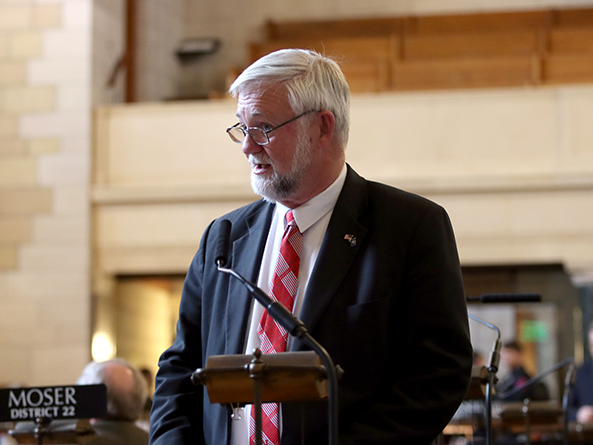Session Review: General Affairs
Measures to expand keno play and track alcoholic products being imported into the state were among those advanced by the General Affairs Committee and packaged into two omnibus bills this session.
Gaming
Lawmakers approved several updates to Nebraska gaming law.
LB775, introduced by Kearney Sen. John Lowe and passed 46-0, updates the definition of a licensed racetrack enclosure to include all real property licensed and used to conduct a race meeting, including the racetrack and any grandstand, concession stand, office, bar area, employee housing facility, parking lot or additional area designated by the State Racing and Gaming Commission.
Additionally, the bill grants the commission authority to create an adjudication subcommittee to investigate and respond to violations of the Nebraska Racetrack Gaming Act.
The provisions of LB232, introduced by Omaha Sen. John Cavanaugh, also are included in the bill. Under the measure, players verified to be on the premises of a licensed Nebraska lottery location are able to purchase digital keno tickets.
A lottery operator must file with the state Department of Revenue and provide clear procedural regulations in order to sell digital on-premises tickets. All regulations are subject to approval by the department.
The proposal also authorizes the use of additional ticket payment methods, including a debit card, bank account, prepaid cash account or the cash balance of a payment application. Debit cards are limited to $200 in keno wagers from a lottery operator in a single calendar day.
LB775 includes provisions from three other bills considered by the General Affairs Committee this session:
• LB72, introduced by Grand Island Sen. Raymond Aguilar, which amends the County and City Lottery Act to clarify that gross proceeds do not include any admission costs collected at any location where the lottery also is available to the public free of an admission charge;
• LB73, also introduced by Aguilar, which authorizes the use of funds from the County Visitors Promotion Fund to improve a facility in which a parimutuel wager is conducted if the facility also serves as the site of a state fair or district or county agricultural society fair; and
• LB544, sponsored by Sen. Danielle Conrad of Lincoln, which makes minor changes to the Nebraska Bingo Act to reflect advancements in technology.
A bill that would have extended the deadline for studies evaluating horse racing and casino gaming in Nebraska remains in committee.
Under current Nebraska law, the state Racing and Gaming Commission is required to conduct a market analysis and socioeconomic impact study on horse racing and casino gaming statewide and in each county that has a licensed racetrack before any new licenses can be issued.
This stipulation was put in place last year in a continuing effort by the Legislature to implement a 2020 voter initiative that legalized all games of chance at licensed horse racing tracks.
LB311, introduced by Lowe, would change the deadline to complete the studies from Jan. 1, 2025, to Jan. 1, 2029, although the commission could choose to complete the requirements at an earlier date.
Alcohol
Senators approved a number of changes to the Nebraska Liquor Control Act this session.
LB376, introduced by Lowe, creates a brand registration for the state Liquor Control Commission to accurately identify and track alcoholic products imported into Nebraska.
Beginning Jan. 1, 2024, every licensed manufacturer, wholesaler and shipper will be required to pay a registration fee — not to exceed $30 — and submit a report to the commission prior to the sale or shipment of any alcoholic liquor into the state.
Provisions of five additional measures heard by the General Affairs Committee are included in the bill:
• LB259, introduced by Lowe, which allows farm wineries to apply for a license to sell beer, mixed drinks and other alcoholic beverages not produced by the farm winery for consumption on their premises;
• LB377, also introduced by Lowe, which increases from six to 12 the maximum number of Special Designated Licenses that a nonprofit may apply for in a calendar year;
• LB452, sponsored by Glenvil Sen. Dave Murman, which allows the holder of a microdistillery license to sell up to 500 gallons of their products directly to licensed retail facilities annually;
• LB596, introduced by Sen. Brian Hardin of Gering, which permits liquor manufacturers and wholesalers to enter into an advertising or sponsorship agreement with a nonprofit organization, municipal or religious corporation or political subdivision that holds an SDL if a similar measure is passed at the federal level; and
• LB667, sponsored by Sen. Jana Hughes of Seward, which authorizes alcohol wholesalers to use channel pricing — a strategy used to determine a product’s price based on the retailer’s license and business type.
LB376 passed on a 41-0 vote and took effect immediately.


